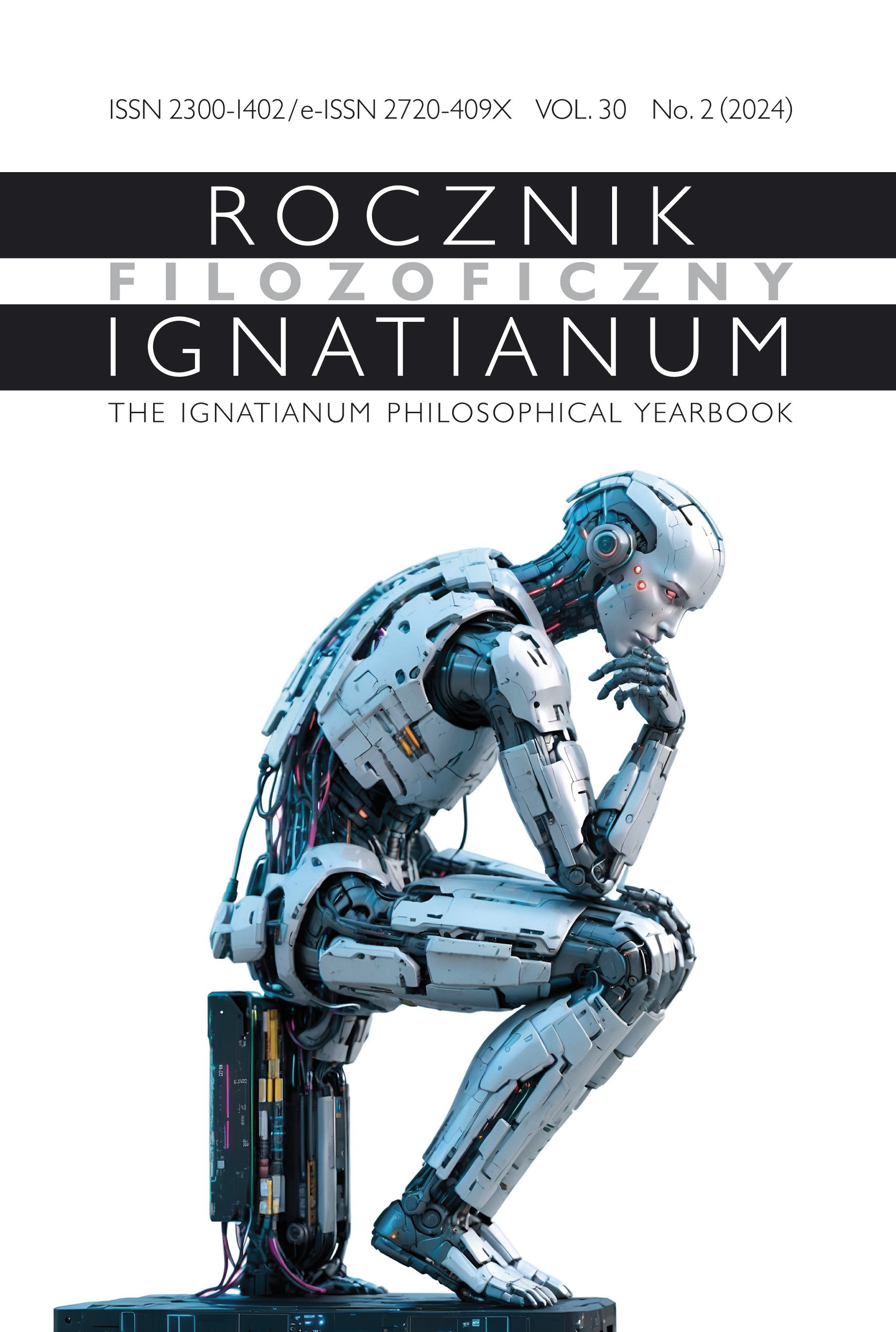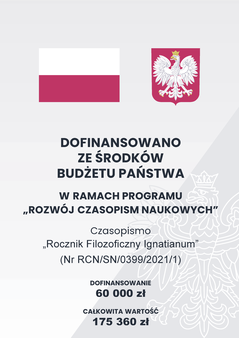Pragnienie Nieobecnego. Dynamika miłości i pragnienia w myśli Beatrycze z Nazaretu i Ryszarda od św. Wiktora
Abstrakt
Artykuł koncentruje się na trzech aspektach doświadczenia miłosnego pragnienia. Chcę pokazać, że po pierwsze średniowieczni autorzy mistyczni – Ryszard od św. Wiktora, Beatrycze z Nazaretu i inni – w analizie ludzkiej drogi do Boga przenieśli punkt ciężkości z zaspokojenia pragnienia Boga na sam akt pragnienia (Boga, tj. przedmiotu miłości). Po drugie dopuszczali oni możliwość, że doświadczenie duchowe może manifestować się w ciele, można go doświadczać zmysłowo i cieleśnie. I po trzecie zauważyli, że pragnieniu miłości często towarzyszyły cierpienie oraz ból. Z ich rozważań wyłania się obraz dynamiki miłości i pragnienia: nieobecność przedmiotu, niezaspokojone pragnienie, cielesność i elementy cierpienia są ze sobą powiązane w ten sposób, że wszystkie tworzą aspekty doświadczenia afektywnego. Powyższe cechy są zatem aspektami jednego doświadczenia: pragnienie jest związane z nieobecnością przedmiotu, cielesne doświadczanie pragnienia często przybiera postać fizycznego bólu i cierpienia.
Charakterystyka trzech wymienionych aspektów – nieobecności przedmiotu pragnienia, roli cielesności w pragnieniu oraz obecności cierpienia w pragnieniu miłosnym – zostanie przedstawiona w trzech kolejnych częściach niniejszego artykułu.
Bibliografia
Arblaster John, Faesen Rob (red.), Mystical Anthropology. Authors from the Low Countries (New York: Routledge, 2017).
Astel Ann W., The Song of songs in the Middle Ages (London: Cornell University Press, 1990).
Augustyn, De doctrina christiana. O nauce chrześcijańskiej, tekst polsko-łaciński przełożył, wstępem i komentarzem opatrzył J. Sulowski (Warszawa: Instytut Wydawniczy PAX, 1989).
Augustyn, Wyznania, tłum. Z. Kubiak (Warszawa: Instytut Wydawniczy Pax, 1992).
Bonaventura, Legenda Maior, w: S. Bonaventurae opera omnia, vol. 10: Legendae s. Francisci Assisiensis saeculis XIII et XIV conscriptae (Florentia: Quaracchi, 1941).
Casey Michael, Athirst for God: spiritual desire in Bernard of Clairvaux’s Sermons on the Song of songs (Kalamazoo: Cictercian Publications, 1988).
Chmielewski Marek (red.), Leksykon duchowości katolickiej (Lublin–Kraków: Wydawnictwo „M”, 2002).
Coakley Sarah, Stang Charles M. (red.), Re-thinking Dionysius the Areopagite (Hoboken: Wiley-Blackwell, 2009).
Davis Robert Glenn, The Weight of Love. Affect, Ecstasy, and Union in the Theology of Bonaventure (New York: Fordham University Press, 2017).
Hendrix Guido, Hugo de Sancto Caro’s traktaat De doctrina cordis (Leuven: Bibliotheek van de Faculteit Godgeleerdheid, 1995).
Hollywood Amy, Acute Melancholia and Other Essays. Mysticism, History and the Study of Religion (New York: Columbia University Press, 2016).
Hollywood Amy, Sensible Ecstasy: Mysticism, Sexual Difference, and the Demands of History (Chicago: University of Chicago Press, 2002).
Huls Jos (red.), The Minne-Journey: Beatrice of Nazareth’s “Seven Ways of Minne.” Mystical Process and Mystagogical Implications (Leuven: Peeters, 2013).
Kitanov Severinus V., Beatific Enjoyment in Medieval Scholastic Debates. The Complex Legacy of Saint Augustine and Peter Lombard (New York: Lexington Books, 2018).
Kroll Jerome, Bacrach Bernard, The Mystic Mind. The Psychology of Medieval Mystics and Ascetics (New York–London: Routledge, 2005).
Nelstrop Louise, Podmore Simon D. (red.), Exploring Lost Dimensions in Christian Mysticism: Opening to the Mystical (London: Routledge, 1967).
Petroff Elizabeth, Body and Soul: Essays on Medieval Women and Mysticism (New York: Oxford University Press, 1994).
Płotka Magdalena, Tomasz z Akwinu o przyjemności (Warszawa: Wydawnictwo UKSW, 2021).
Richard of St. Victor, Les quatre degrés de la violente charité, red. Gervais Dumeige (Paris: Librairie philosophique J. Vrin, 1955).
Stevens Travis A., Violent Lovesickness: Richard of St Victor, Beatrice of Nazareth, Hadewijch, and Angela of Foligno (Massachusetts: Harvard University Cambridge, 2017).
Wilhelm von Saint Thierry, „Expositio super Cantica Canticorum”, w: Paul Verdeyen (red.), Guillelmi a Sancto Theodorico Opera Omnia, Pars II (Turnhout: Brepols, 1997).
Faesen Rob, „Embraced in the Fathomless Love”, Medieval Mystical Theology 23 (1) (2014): 10–19.
McGinn Bernard, „Ecstasy in Classic Christian Mysticism”, Lo Sguardo – rivista di filosofia 33 (2) (2021): 187–213.
Miller Julie B., “Eroticized Violence in Medieval Women’s Mystical Literature: A Call for a Feminist”, Journal of Feminist Studies in Religion 15 (2) (1999): 25–49.
Nelstrop Louise, „Introduction: Searching for Soul Rebels: Christian Mysticism and Pleasure after Augustine”, Medieval Mystical Theology 23 (1) (2014): 3–9. Płotka Magdalena, „Afektywna droga do Boga w ujęciu Bonawentury”, Rocznik Tomistyczny 12 (2023) 1: 127–138.
Talos Maurius, „How can love be violent? Reflections on Richard of St. Victor’s On the four degrees of violent love”, Agathos: An International Review of the Humanities and Social Sciences (2012): 61–69.
De quatuor gradibus violentae caritatis, introd. and trans. Andrew B. Kraebel, w: H. Feisse OSB (red.), On Love. A Selection of Works of Hugh, Adam, Achard, Richard and Godfrey of St. Victor (Turnhout: Brepols, 2011), 263–298. Richard of St. Victor, On the four degrees of violent love, w: Hugh Feiss OSB (red.), On Love: A Selection of Works of Hugh, Adam, Achard, Richard, and Godfrey of St. Victor (Brepols 2011), 275–296.
Copyright (c) 2024 Uniwersytet Ignatianum w Krakowie

Utwór dostępny jest na licencji Creative Commons Uznanie autorstwa 4.0 Międzynarodowe.
Rocznik przyjmuje do druku wyłącznie materiały, które nie wchodzą w żaden konflikt interesów, żaden konflikt z prawem autorskim itp. Redakcja prowadzi działania przeciw: plagiatom, ghostwriting1, guest/honorary authorship2 itp. Autor pracy zbiorowej, który jest pierwszy na liście, bierze na siebie odpowiedzialność i ma obowiązek przedstawić wkład wszystkich współautorów. Jeśli publikacja powstała dzięki dedykowanym środkom finansowym, należy ujawnić to np. w Podziękowaniu, przypisie itp. Ew. przedruki wymagają jawnego zgłoszenia i okazania odpowiedniego pozwolenia wydawniczego. Autorzy / Recenzenci nierzetelni narażają się na reakcję właściwą stosownym instytucjom.
______
1 Ma to miejsce, gdy osoba mająca istotny wkład jest pominięta na liście Autorów czy w Podziękowaniu.
2 Zachodzi, gdy na liście autorskiej pojawia się osoba mająca znikomy/żaden udział w pracy.





